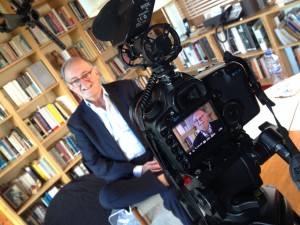Philosopher Martin Heidegger (1889-1976) requested before his death that the collection of his writings be called ‘paths, not works’. He had used the word ‘paths’ several times. It provides, according to some interpreters of his ‘works’, an image of ‘leading’ but not necessarily to anywhere in particular; like many paths do in the woods.
Good leaders are good path makers. Sometimes the journey is not clear. The destination may still be ambiguous. It’s the journey, stupid! Pretending that there is a fixed destination and that you know all the highways, roads and pathways, does not make you a good or better leader.
The great Spanish poet Antonio Machado (1875-1939) said it well in one of his most acclaimed poems. It would read in English something like this: ‘Walker, there is no path to follow, you make the path by walking’.
The allegory of the Path, whether Machado’s path making or Heidegger’s ‘paths, not works’, is a good allegory for leadership. I have spoken before of the leader as a Cartographer, as a map maker (New Leaders Wanted, 2007).
Pilgrimage is also a good metaphor for a leadership journey, a journey not in solitude but accompanied by followers. Not surprisingly, the image of the Journey is also frequently associated to leadership. The Journey contains all sorts of challenges and discoveries for the pilgrim, as it does for the leader.
All this is crucial to a form of ‘leadership thinking’ in short supply: the reflective one, the emergent, the discoverable, the non prescriptive. I make no secrets of my mistrust towards ‘a set of characteristics’ or ‘a list of attributes’ of the good leader. Yet, I understand those ‘sets’ (very often of dubious evidence-based origin) as maps in themselves. I respect the maps, but not when they become an end in themselves.
I am in favour of any path, in any Journey, that prompts questions. Question such as ‘what does it mean to be a leader here?’, or ‘why would anybody come with me on this journey where we are going to make the path by walking?’
I am worried about our natural ability to provide answers even without the questions. Off-the-shelf leadership development is not healthy. It is finished works, not paths in the making.
________________________________________________________________________________________________
Dr Leandro Herrero is the CEO and Chief Organization Architect of The Chalfont Project, an international firm of organizational architects. He is the pioneer of Viral ChangeTM, a people Mobilizing Platform, a methodology that delivers large scale behavioural and cultural change in organizations, which creates lasting capacity for changeability.
Dr Herrero is also an Executive Fellow at the Centre for the Future of Organization, Drucker School of Management. An international speaker, Dr Herrero is available for virtual speaking engagements and can be reached at: The Chalfont Project.




Would you like to comment?